Wes Anderson films are easy to spot, but not always easy to describe. Watching them feels like stepping inside a handcrafted diorama of history: symmetrical, stylized, and slightly sentimental. From the wry narration and sharp color palettes to his signature whip pans and deadpan dialogue, Anderson crafts cinematic worlds where emotions are bottled then uncorked with poetic absurdity.
With The Phoenician Scheme, Anderson pivots again, this time into political satire. Think There Will Be Blood by way of a dollhouse. At the center is Zsa-Zsa Korda, a cigar-smoking, bird-loving oil tycoon with the cryptic charisma (and multiple assassination attempts) of Kevin Kline’s character in I Love You to Death (1990). Played with strange magnetism by Benicio del Toro, Zsa-Zsa anchors one of Anderson’s oddest and most divisive films yet.
It’s a lot to take in, so here’s your need-to-know guide before jumping in to The Phoenician Scheme.
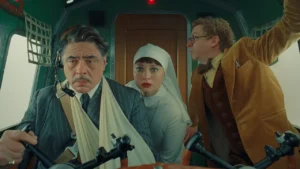
What’s the Story?
Zsa-Zsa Korda is one of the wealthiest and most targeted men in Europe. After surviving his sixth plane crash (yes, sixth), he sets out to finalize his decades-long oil and infrastructure project: the Phoenician Scheme, a plan to reshape a dormant region into a global economic powerhouse.
But enemies are everywhere. Corporate rivals. Assassins. Foreign governments. Even his beverages might be poisoned.
Facing pressure from all sides, Zsa-Zsa appoints an unlikely heir: his estranged daughter Liesl (Mia Threapleton), a 20-year-old nun who wants nothing to do with his empire or his ego. As Liesl quietly investigates her mother’s death, she’s joined by Bjørn Lund (Michael Cera), an eccentric nature-loving tutor. What unfolds is a stylized swirl of ideologies, betrayals, family dysfunction, and industrial ambition.
The Watercooler Talk
This might be Anderson’s most political film yet. While still filtered through his whimsical aesthetic, The Phoenician Scheme tackles climate anxiety, capitalism, inherited trauma, and the delusion of “legacy.” One moment, del Toro is waxing poetic about the future of fossil fuels. Next, he’s dodging gunfire in a pastel-colored helicopter.
It’s tense. It’s weird. It’s very Wes.
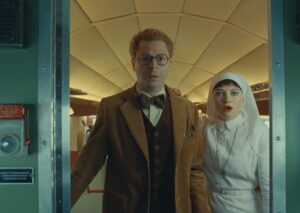
What’s It Really About?
Beneath the layered dialogue and stunning mise-en-scène, The Phoenician Scheme wrestles with power—how it’s acquired, preserved, and eventually corrupted. But as I watched, a few deeper themes kept surfacing.
The Question of Faith vs Power
Outside of Liesl, who’s the only character we know to be a nun, religion isn’t necessarily front and center, but it lingers in the background, shaping conversations and character motivations. Whenever belief systems come up in dialogue, especially in Liesl’s interactions, there’s a sense of quiet tension. The film explores this further in its haunting cutaways: black-and-white sequences that resemble purgatory, or when Korda drifts into dreams or teeters on the brink of death. It quietly asks, How important is religion to these people? Not just for Zsa-Zsa, but for the entire family. What does faith look like in a world so consumed by legacy and power?
The Meaning of Legacy
Legacy is a clear throughline; it’s where the film begins and what drives much of the tension. We watch Zsa-Zsa choose Liesl, his estranged daughter, as his successor, not any of his sons, who’ve stayed close and built the business with him. Why her? That question lingers. And Liesl’s relationship with her father’s empire is complicated. She doesn’t want the life he built—not really—because she knows it requires crossing a moral line.
But she does care deeply about her family. She wants a real connection with her brothers, not just as siblings, but as someone who can offer the kind of emotional and spiritual guidance they’ve been missing. That lack of emotional intelligence? It’s what she fears will turn them into reflections of their father. She sees it clearly, and she’s trying to stop the cycle.
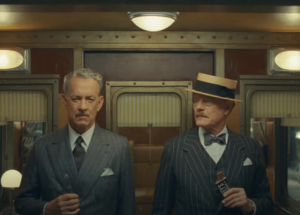
Morality vs. Survival
Set in the 1950s, the film repeatedly returns to one unspoken question: How much do our circumstances shape our ethics? Over and over, I found myself wondering how many of the characters’ choices were truly moral, or just necessary. They all want money, security, and power. But at what cost?
Zsa-Zsa, for all his bravado, begins to feel like a product of his environment. As the story unfolds, we see glimpses of vulnerable moments that make him feel less like a mythical figure and more like a man shaped (and broken) by the world around him. And that’s where the film’s tension lives: in the thin, fragile space between survival and sacrifice.
The Key Players
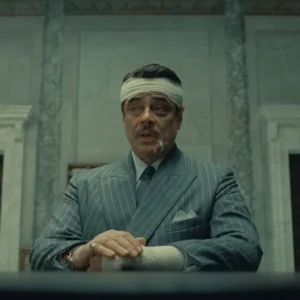 Benicio del Toro as Zsa-Zsa Korda
Benicio del Toro as Zsa-Zsa Korda
Del Toro disappears into the role of an aging oil magnate who’s equal parts visionary, villain, and unreliable narrator. Zsa-Zsa is obsessed with his legacy, terrified of betrayal, and full of contradictions. His relationships oscillate between deeply personal and coldly transactional. Is he a genius? A fraud? Both?
Mia Threapleton as Liesl Korda
Threapleton brings sharp focus to the film’s emotional center. Liesl, a nun unimpressed by her father’s empire, is calm, observant, and unflinchingly honest. Her stillness contrasts beautifully with Zsa-Zsa’s chaos. As her faith is challenged, her quiet evolution becomes a highlight—proof that strength can whisper, not shout.
Michael Cera as Bjørn Lund
As Zsa-Zsa’s tutor and resident science nerd, Bjørn is part conscience, part comic relief. Cera plays him with gentle quirk and subtle depth. His dynamic with Liesl sparks a fascinating science-versus-faith subplot. Zsa-Zsa, paranoid and often unhinged, even subjects him to a lie detector—because of course he does.
 Riz Ahmed as Prince Farouk
Riz Ahmed as Prince Farouk
A smooth and charming royal oil partner, Farouk is as fascinated by Zsa-Zsa’s survival instincts as he is wary of his slippery ethics. His scenes are calm on the surface, but there’s tension beneath, especially when dealing with Middle Eastern energy politics and Zsa-Zsa’s long game.
Jeffrey Wright as Marty
A shipping tycoon with swagger and smarts, Marty may be Zsa-Zsa’s most worthy adversary. Wright brings gravitas and sharp timing to every scene—he’s the kind of businessman who plays chess while everyone else plays checkers.
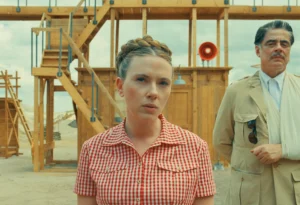
Scarlett Johansson as Cousin Hilda
Yes, she’s Zsa-Zsa’s cousin. Yes, there’s romantic tension. But Cousin Hilda is more than a scandalous subplot—she’s a savvy investor with a vision for a utopia Zsa-Zsa wants in on. Their scenes crackle with equal parts flirtation and frustration.
Tom Hanks and Bryan Cranston as Reagan and Leland
Scene stealers. These wealthy railroad moguls bring big energy in their brief but brilliant roles. Their onscreen basketball showdown with Zsa-Zsa (yes, you read that right) is one of the film’s best scenes: absurd, tense, and laugh-out-loud funny. The trash talk alone is worth the ticket.
 Benedict Cumberbatch as Uncle Nubar
Benedict Cumberbatch as Uncle Nubar
Zsa-Zsa’s wealthier, angrier brother, Uncle Nubar wants him gone—emotionally, financially, and maybe literally. Cumberbatch goes full cartoon villain in a performance that’s part Count Olaf, part Bond baddie. It’s theatrical and unhinged in all the right ways.
Why See It in Theaters?
Two words: Benicio. Del Toro. He commands every frame with a performance that’s philosophical, unpredictable, and oddly moving. Cera and Threapleton deliver excellent turns, and the visual world Anderson builds is, as always, worth seeing on the big screen. And then there’s that unforgettable basketball game. Trust us—you’ll want to watch that unfold in a packed theater.
What Critics Are Saying
The Phoenician Scheme is already drawing comparisons to The Grand Budapest Hotel and There Will Be Blood, with outlets praising its narrative ambition and striking visuals. Some critics are giving Wes Anderson’s latest a firm thumbs-up—like Julian Roman of MovieWeb, who writes: “The Phoenician Scheme is a hilarious return to comic form for Wes Anderson. Benicio del Toro leads an impressive cast to wacky glory, but it’s supporting performances from Mia Threapleton and Michael Cera that will have audiences rolling in the aisles.”
Kyle Smith of The Wall Street Journal offers a slightly more measured take. “Given that The Phoenician Scheme essentially concludes by saying, as some of the director’s other movies did, ‘Forgive your ridiculous dad for his failings,’ its major attraction is the whimsy with which it is decorated, or suffused, or infested.”
But not everyone is impressed. Critics like NPR’s Justin Chang called it “a chillier, more globe-trotting affair,” while Brian Viner of the UK Daily Mail remarked: “It’s consistently lovely on the eye. And it has a terrific, genuinely funny opening—but it careers downhill thereafter.”
Then there’s Dana Stevens from Slate, who didn’t hold back: “Wes Anderson’s new movie may be his worst yet.”
My take? The Phoenician Scheme may not be the easiest Wes Anderson film to summarize—and honestly, it’s not one of his best. It starts with a bang and introduces us to an intriguing new character, but then it shifts tonally. At times, it can feel stale. But like a flickering flame, there are still moments—funny, surprising, even a little shocking—that catch you off guard. If you’re a diehard Anderson fan or someone deeply tuned in to the craft of filmmaking, you’ll want to watch it on the big screen.
So, Who’s This For?
If you’re already a Wes Anderson devotee, The Phoenician Scheme is another intricate addition to his cinematic world. You’ll find his signature style—color-coded interiors, precise blocking, quirky montages—intact, and maybe a bit sharper than usual.
But if you’re craving action, speed, or plot-driven storytelling, this may not be your cup of artisanal tea. It’s a slow burn, sometimes too slow, but one with glimmers of brilliance and an ensemble that brings Anderson’s surreal world to life.
Final Verdict
The Phoenician Scheme is not Anderson’s strongest work, but it is one of his boldest. It starts with a bang, meanders through philosophical back roads, and ends with a strangely poignant look at mortality. It may not win over his skeptics, but it offers just enough sparks, whether through laughter, surprise, or sheer visual spectacle, to keep the fire alive.
Watch it in theaters if you’re curious. Stream it later if you’re cautious. Either way, it’s a wild ride through one of cinema’s most distinctive imaginations.
What to Watch After:
For a more playful, comedic flashback, look for Bottle Rocket ($4.99 on Prime), Wes Anderson’s very first feature, which premiered in 1996 with a young Luke and Owen Wilson.
For deeper dives to stretch your mind and imagination, try There Will Be Blood starring Daniel Day-Lewis, or I Love You to Death starring Kevin Kline.


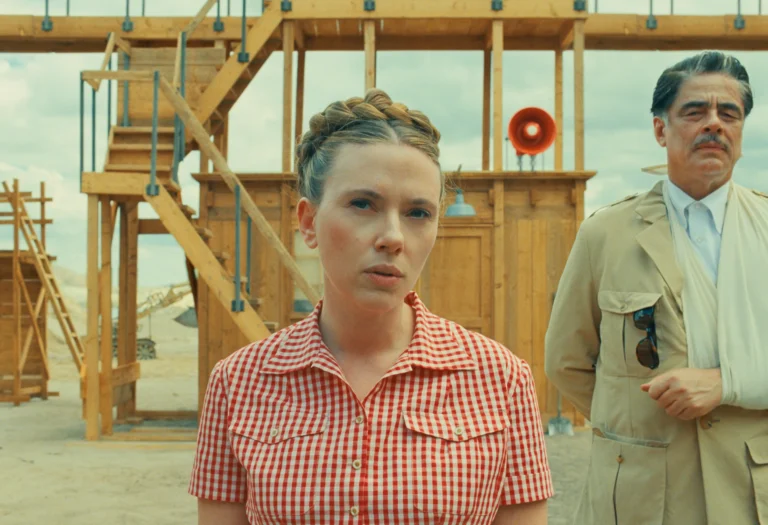
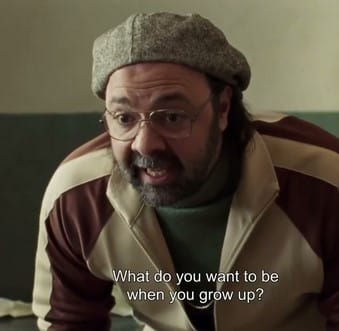
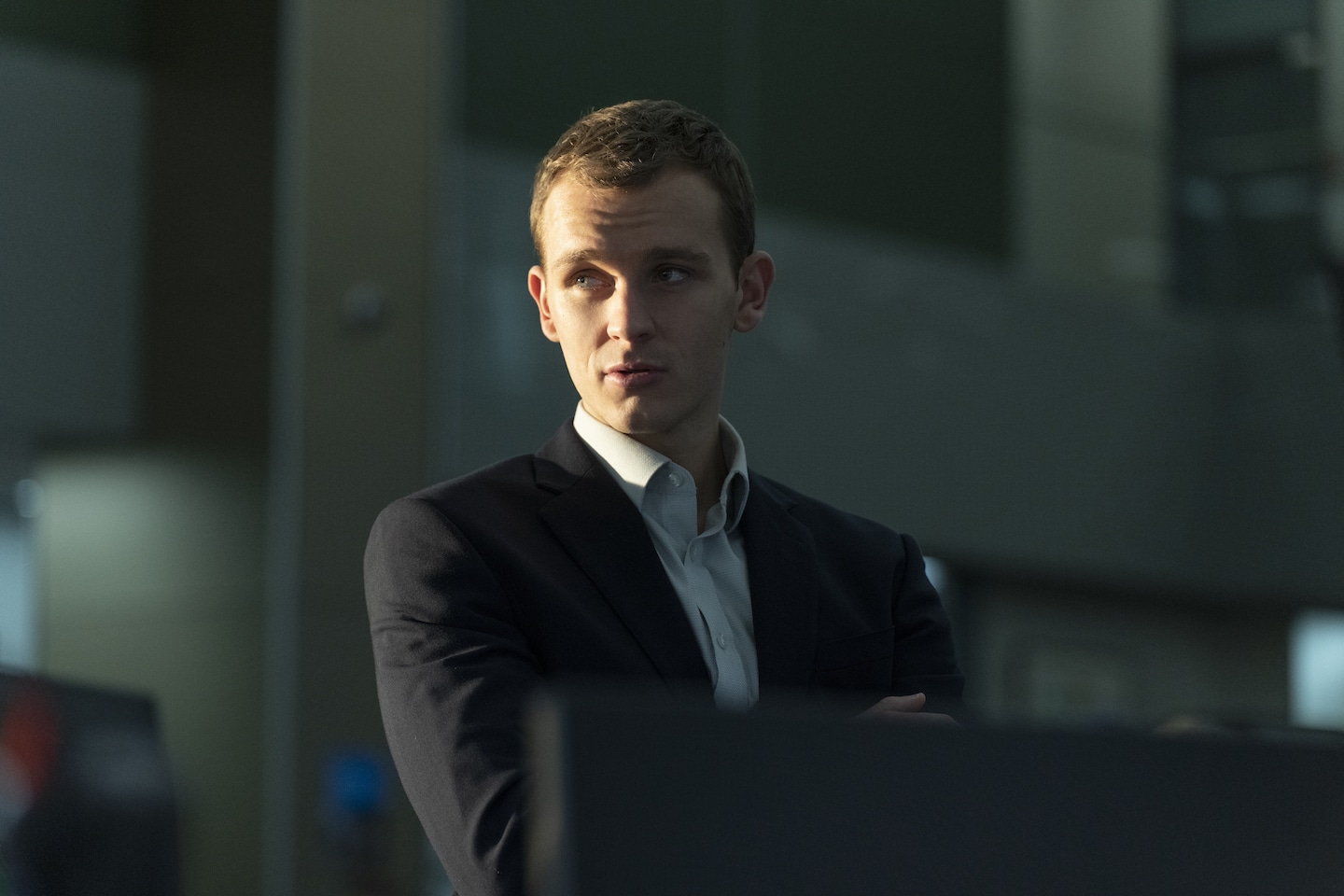

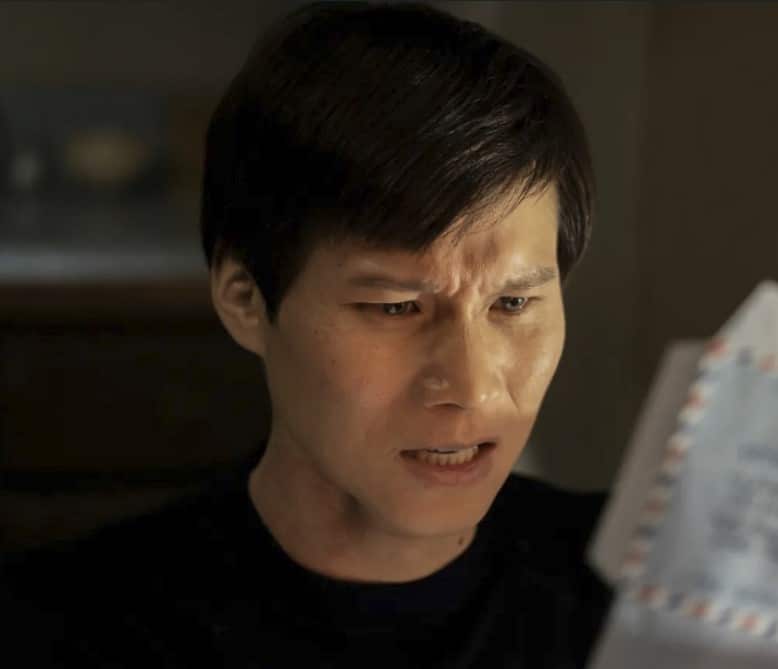


Start a watercooler conversation: